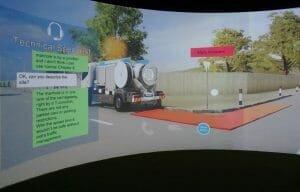Drainage and utility specialist Lanes Group plc has won a coveted water industry innovation award for its development of the world’s first virtual reality team training theatre.
The company has won the Institute of Water of Innovation Award 2020 for the South East Region for leading the development of virtual reality (VR) capability in a 3600video theatre.Lanes is now using the VR training theatre, in Slough, Berkshire, to allow wastewater engineers working for Thames Water to test their knowledge and skills together as a team by participating in training games in a virtual world.
The Institute of Water, the main professional body for the water industry, said the standard of entries had been extremely high, but the development, by Lanes, of a people-driven innovation was timely for the water industry and had clearly generated significant benefits.
The immersive VR training system will now compete against other regional winners for the national Institute of Water Innovation Award.
Lanes has been the first company in the world to use an Igloo cylindrical video theatre for training. It has now gone a step further to add VR capability, creating a new technology it calls Shared VR in Igloo.
The training games replace conventional class-based learning, allowing colleagues to test their knowledge and skills in a safe but highly realistic environment before they need to use them for real.
Lanes Director Andy Brierley said: “It’s fantastic that the Institute of Water has recognised what is an exciting and new training resource for us and an exciting new training experience for our teams.
“Shared VR in Igloo is allowing us to develop high impact results through gamification of training that is already transforming our ability to create skilled, engaged and safe operational teams fit for the 21stCentury and beyond.”
Lanes is the wastewater network services maintenance partner for Thames Water, which shared the cost of investing in the Igloo theatre. Its sophisticated 4K projection system makes participants feel they are immersed right into the centre of the action.
Now it is VR-enabled, Lanes wastewater engineers can enter the 7m-wide facility and take part in training games by interacting with a digitally generated virtual environment called Thames World.
Two training games have been developed so far, one to develop skills and knowledge for dealing with drain blockages and the latest to train teams to set up safe traffic management. More are planned, including pollution control and confined space entry.
James Brewer, Learning and Development Specialist for Lanes on the Thames Water contract, said: “New training games will be developed in line with operational priorities. For example, working on highways is one of the biggest risks for any utility services provider.
“Therefore, it made sense for us to use this powerful new technology to develop training that will counter those risks and help keep our teams, other road users and pedestrians safe while we work.
“The highly-immersive experience of Shared VR training games is designed to be attractive to a new generation of colleagues who are very familiar with gaming technology. VR training has been shown to have an 80% higher retention rate compared with conventional training.
“Through Shared VR in Igloo, we have the potential here to accelerate and deepen the learning of skills and behaviours that are vital to our operations.”
The traffic management training game requires trainees to select the right traffic management set up for operating in two different highway scenarios – one a rural road, the other an urban one. In both cases, two options can be selected: work on a straight section of road or on a junction.

The game challenges trainees to make decisions relating to risk assessment, safe positioning of vehicles, barrier and cone deployment, sign set-up and team communication.
Key variables, such as the position of bus stops, and safety-related road markings, change each time the game is played to present players with new challenges.
Teams taking part receive Thames Water gold coins for identifying specific hazards and their performance is scored. This allows Lanes to set pass rates, to introduce team competition, and monitor the progress of both teams and individuals in their training development.
Shared VR in Igloo has been made possible by the integration, for the first time, of VR headset software with the Igloo’s projection system.
Lanes commissioned VR specialist Myriad Global Media to work with Igloo Vision, which designs and manufactures the video theatres, to make this happen.
Shared VR in Igloo is a key part in a range of training, safety, people development and wellbeing initiatives developed by Lanes to improve staff retention and resilience, develop operational capability and underpin outstanding customer service.
The technology is already attracting interest across the world, with other utility companies, banks and manufacturers among the organisations now considering how they, too, can use Shared VR in Igloo.
Andy Brierley said: “VR using headsets is an excellent training tool. But it allows just one person to train in the virtual space at a time.
“Shared VR in Igloo is a real gamechanger. For the first time, our teams can train together in a virtual world, supporting team learning and team building.
“We can also bring together colleagues from different parts of our operation, field workers and office staff, so they get to understand each other’s roles and work together to develop better ways to deliver excellent customer service.
“That’s incredibly powerful for us because the safety and customer excellence of our services depends on great team delivery.”
Lanes Group: www.lanesfordrains.co.uk



